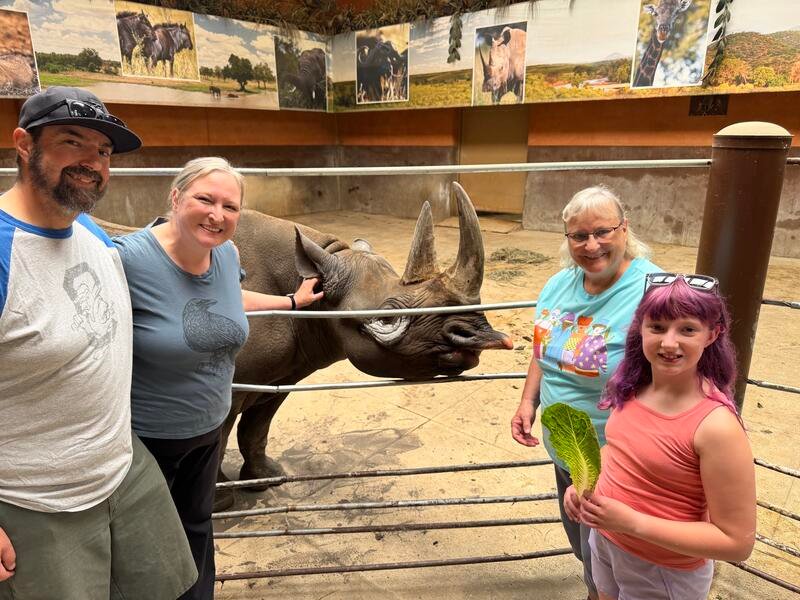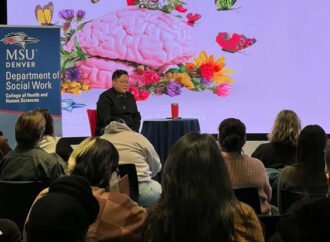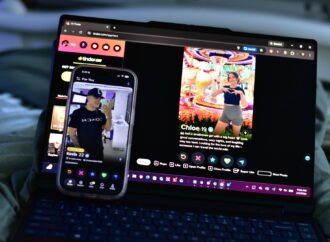Over the past decade, colorectal cancer rates have gone down overall, but rates in people younger than age 50 have gone up by about 2% each year, the American Cancer Society says. Denise DePaolo, 42, paid attention to the numbers, but also her own family history. Her father, like so many others from his generation,
Over the past decade, colorectal cancer rates have gone down overall, but rates in people younger than age 50 have gone up by about 2% each year, the American Cancer Society says.
Denise DePaolo, 42, paid attention to the numbers, but also her own family history.
Her father, like so many others from his generation, waited until he was in his 50s to seek the preventive care that might have helped him avoid the colorectal cancer that ended his life.
“He didn’t prioritize getting a colonoscopy,” she said. “At the time, I think it was pretty common to wait like he did. Unfortunately, by then it was too late.”
He died in 2011 at age 62.
DePaolo, director of public relations and marketing at the Great Plains Zoo in Sioux Falls, South Dakota, had her first colonoscopy at age 33 when some irregularities arose after the birth of her daughter.
Keeping up with testing
It turned out the symptoms were minor complications associated with pregnancy, but she keeps up with her colonoscopies now. A few years later, another colonoscopy led to the removal of noncancerous small polyps that may have developed into a problem if she had delayed another screening.
“I’m so grateful they found them,” she said. “I continued to go back periodically to make sure they haven’t regenerated.”
Several members of DePaolo’s extended family have dealt with colon cancer and, via early detection, were able to avoid more serious complications.
“I don’t mean to be crass, but I’m a big believer in getting in there and finding out what’s happening,” DePaolo said. “We need to identify cancer as soon as possible.”
According to the American Cancer Society, colorectal cancer is the third most commonly diagnosed cancer and the second most common cause of cancer-related death in both men and women in the United States.
The cancer society estimates the lifetime risk of developing colorectal cancer is 1 in 24 for men and 1 in 26 for women. However, with early detection, 9 out of 10 people have no evidence of their cancer five years later.
What to expect from a colonoscopy
At Sanford Health, patients who schedule a colonoscopy can expect the following:
- Your doctor will give you specific ways to prepare for the test such as drinking a special fluid that helps clean out your bowel.
- You will be asked to fast before the procedure.
- You may get additional instructions about a special diet for one to two days prior to the procedure.
During your colonoscopy:
- You will be given a gown to wear, and you’ll lie down on your side.
- You may get a sedative to help you relax or sleep.
- The whole procedure is done in about 30 minutes.
After your colonoscopy:
- You can go home the same day and go back to work and regular activities the next day.
- Your doctor may ask you to follow a special diet for the first 24 hours after the procedure.
- If your doctor removed polyps or took samples, they will probably tell you right after your procedure. If more testing is needed, your results may take a few weeks.
How you can help yourself
The American Cancer Society reports that more than half of all colorectal cancers are attributable to modifiable risk factors. Smoking, an unhealthy diet, high alcohol consumption, physical inactivity, and excess body weight can all make you more likely to develop colorectal cancer.
Translation: Though stats indicate colorectal cancer is a serious health problem, it is also one of the most preventable.
The essential message DePaolo is committed to sending is to avoid colorectal cancer, pay attention. Follow recommended guidelines and maintain your regular rapport with your primary provider.
“There’s no age too young to know what’s going on in your body,” she said. “This is typically a slow-growing cancer and the best thing you can do is to get ahead of it. If you can find out what is going on when you’re 40, why would you want to wait until you’re 50?”
What to do next
If you’re age 45 or older and due for a colorectal screening, schedule a colonoscopy by calling your clinic or requesting one through My Sanford Chart. Go to Menu and select Request a Colonoscopy, located near the bottom of the Communication section.
If you’re under age 45 but have symptoms or a family history of colon cancer, request a colonoscopy through My Sanford Chart or by scheduling an appointment with your primary care provider.
Learn more
…
Posted In
Family Medicine, Healthy Living, Internal Medicine, Sioux Falls
 Internet Connectz
Internet Connectz 











Leave a Comment
Your email address will not be published. Required fields are marked with *